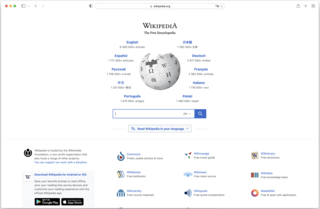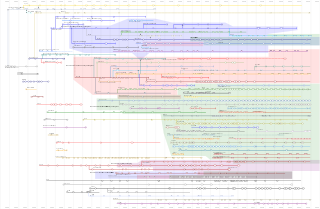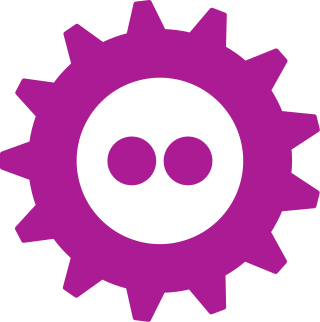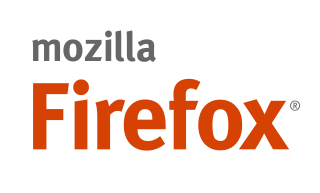
The Internet is the global system of interconnected computer networks that uses the Internet protocol suite (TCP/IP) to communicate between networks and devices. It is a network of networks that consists of private, public, academic, business, and government networks of local to global scope, linked by a broad array of electronic, wireless, and optical networking technologies. The Internet carries a vast range of information resources and services, such as the interlinked hypertext documents and applications of the World Wide Web (WWW), electronic mail, telephony, and file sharing.
Netscape Communications Corporation was an American independent computer services company with headquarters in Mountain View, California, and then Dulles, Virginia. Its Netscape web browser was once dominant but lost to Internet Explorer and other competitors in the so-called first browser war, with its market share falling from more than 90 percent in the mid-1990s to less than one percent in 2006. An early Netscape employee Brendan Eich created the JavaScript programming language, the most widely used language for client-side scripting of web pages and a founding engineer of Netscape Lou Montulli created HTTP cookies. The company also developed SSL which was used for securing online communications before its successor TLS took over.

A web browser is an application for accessing websites. When a user requests a web page from a particular website, the browser retrieves its files from a web server and then displays the page on the user's screen. Browsers are used on a range of devices, including desktops, laptops, tablets, and smartphones. In 2020, an estimated 4.9 billion people have used a browser. The most-used browser is Google Chrome, with a 64% global market share on all devices, followed by Safari with 19%.
Gecko is a browser engine developed by Mozilla. It is used in the Firefox browser, the Thunderbird email client, and many other projects.

The Internet Society (ISOC) is an American nonprofit advocacy organization founded in 1992 with local chapters around the world. Its mission is "to promote the open development, evolution, and use of the Internet for the benefit of all people throughout the world." It has offices in Reston, Virginia, U.S., and Geneva, Switzerland.

A browser war is a competition for dominance in the usage share of web browsers. The "first browser war," (1995–2001) consisted of Internet Explorer and Navigator. Browser wars continued with the decline of Internet Explorer's market share and the popularity of other browsers, including Firefox, Google Chrome, Safari, Microsoft Edge and Opera.
The Association for Progressive Communications (APC) is an international network of organizations that was founded in 1990 to provide communication infrastructure, including Internet-based applications, to groups and individuals who work for peace, human rights, protection of the environment, and sustainability. Pioneering the use of ICTs for civil society, especially in developing countries, APC were often the first providers of Internet in their member countries.

Free and Open source Software Developers' European Meeting (FOSDEM) is a non-commercial, volunteer-organized European event centered on free and open-source software development. It is aimed at developers and anyone interested in the free and open-source software movement. It aims to enable developers to meet and to promote the awareness and use of free and open-source software.
Technology governance means the governance, i.e., the steering between the different sectors—state, business, and NGOs—of the development of technology. It is the idea of governance within technology and its use, as well as the practices behind them. The concept is based on the notion of innovation and of techno-economic paradigm shifts according to the theories by scholars such as Joseph A. Schumpeter, Christopher Freeman, and Carlota Perez.
about is an internal URI scheme implemented in various Web browsers to reveal internal state and built-in functions. It is an IANA officially registered scheme, and is standardized.
Add-on is the Mozilla term for software modules that can be added to the Firefox web browser and related applications. Mozilla hosts them on its official add-on website.

Internet governance consists of a system of laws, rules, policies and practices that dictate how its board members manage and oversee the affairs of any internet related-regulatory body. This article describes how the Internet was and is currently governed, some inherent controversies, and ongoing debates regarding how and why the Internet should or should not be governed in future.

The Internet Governance Forum (IGF) is a multistakeholder governance group for policy dialogue on issues of Internet governance. It brings together all stakeholders in the Internet governance debate, whether they represent governments, the private sector or civil society, including the technical and academic community, on an equal basis and through an open and inclusive process. The establishment of the IGF was formally announced by the United Nations Secretary-General in July 2006. It was first convened in October–November 2006 and has held an annual meeting since then.

Mozilla Firefox 3.0 is a version of the Firefox web browser released on June 17, 2008, by the Mozilla Corporation.

Satish Babu is a Free Software activist, early Internet advocate, and development professional based out of Kerala, India. He is the founding Director of the International Centre for Free and Open Source Software (ICFOSS), an autonomous academic/research institution of the Government of Kerala, India, where he worked from March 2011 to September 2015. He was earlier the CEO of SIFFS, an NGO of small-scale artisanal fishers of south India; a co-founder and President of InApp Information Technologies; and is associated with international and national professional societies such as IEEE, Internet Society (ISOC), ICANN, and the Computer Society of India (CSI).
Mozilla is a free software community founded in 1998 by members of Netscape. The Mozilla community uses, develops, publishes and supports Mozilla products, thereby promoting exclusively free software and open standards, with only minor exceptions. The community is supported institutionally by the non-profit Mozilla Foundation and its tax-paying subsidiary, the Mozilla Corporation.
A national intranet is an Internet Protocol-based walled garden network maintained by a nation state as a national substitute for the global Internet, with the aim of controlling and monitoring the communications of its inhabitants, as well as restricting their access to outside media. Other names have been used, such as the use of the term halal internet in Islamic countries.
Internet.org is a partnership between social networking services company Meta Platforms and six companies that plans to bring affordable access to selected Internet services to less developed countries by increasing efficiency, and facilitating the development of new business models around the provision of Internet access. The app delivering these services was renamed Free Basics in September 2015. As of April 2018, 100 million people were using internet.org.
The NETmundial Initiative (NMI) was a controversial effort to create a new platform for internet governance issues. The NMI was named after an internet governance conference held by the Brazilian government and DNS overseer ICANN in May 2014; it was intended to help turn the conference's final principles into action.
European Dialogue on Internet Governance (EuroDIG) is a Pan-European multi-stakeholder forum focused on Internet Governance. It is a regional sub-forum of the global Internet Governance Forum (IGF). It is an annual meeting with open participation and changing locations across European countries. Participants come from the private sector, governments, civil society, academia, and the technical community. Notable participating institutions are the European Commission and the Council of Europe.







